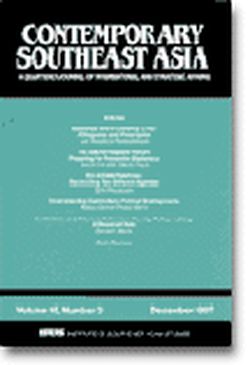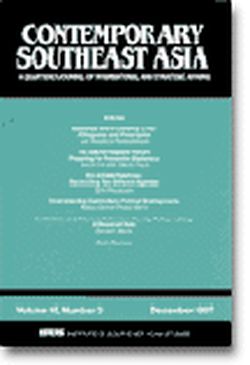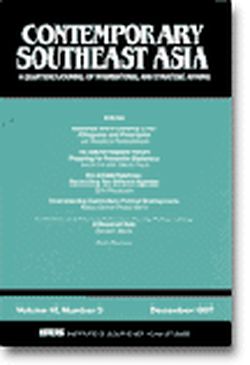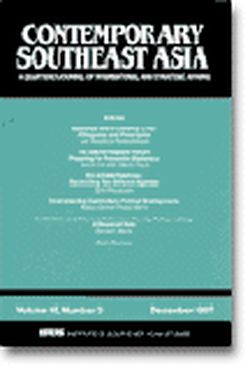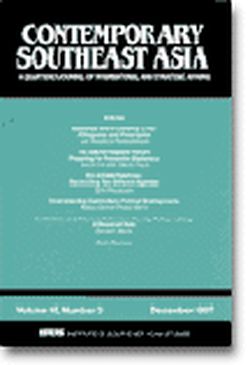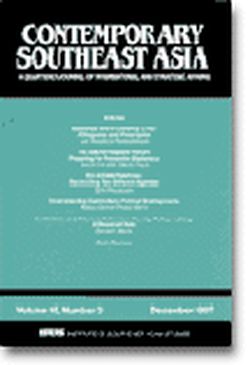Contemporary Southeast Asia: A Journal of International and Strategic Affairs Vol. 10/1 (June 1988)
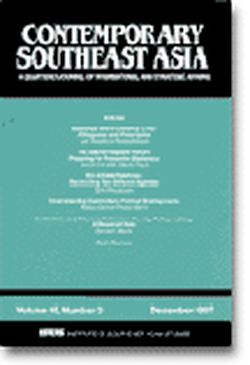
Date of publication:
June 1988
Number of pages:
118
Code:
CS10/1
Contents
-
Preliminary pages
- ARTICLES
-
The Southeast Asian Security Complex, by Barry Buzan, author see abstractThis paper applies the idea of security complexes to the study of regional security in Southeast Asia. First, the idea of security complexes is introduced, followed by a sketch of the pattern of security relations within the Southeast Asian complex, and also sets that pattern into the broader context both of the other local security complexes in Asia, and of the global pattern of great power rivalries. The paper concludes by linking together the patterns of security at the global and local levels, with some consideration given to the continuity and change in the structure of the Southeast Asian complex.
-
Japan's Political and Security Role in the Asia-Pacific Region, by Muthiah Alagappa, author see abstractThis paper examines Japan's present and future international political and security roles especially in the light of changes affecting the three factors (the economy, the U.S. connection, and pacifism) that have had a major impact on Japan's international orientation. The article concludes that Japan is now more favourably disposed to play a comprehensive international role but that the development of this role will continue to be incremental. In the field of security, Japan is likely to continue co-operation with the United States but will assume increasing responsibility for its defence and the security of its immediate environment. Although Japan has strategic interests in Southeast Asia and the Middle East, it is likely to play only a supportive role in these two regions. On the political plane, the paper argues, Japan is well placed to play a regional stabilizer role in Northeast and Southeast Asia, but to do this Japan requires to selectively chart an independent path without undermining strategic relations with the United States.
-
The United States and China in the 1990s, by Paul H Kreisberg, author see abstractSino-U.S. relations converge more closely in the Asia-Pacific region than elsewhere and this trend should continue. A disruption of reform in China or of the international economy could be particularly dangerous to the relationship. The "strategic triangle" is less central to both countries as they improve their ties with Moscow. The security environment could permit real negotiations on reducing threats and on "confidence building" measures to reduce the likelihood of new conflict. Regional co-operation in resolving the Korean conflict is central to this. Japan's economic pre-eminence in Asia and greater political influence will be increasingly important for Sino-U.S. relations. Rapid change in Taiwan-PRC relations and in Taiwan itself also represents a trench which could either enhance or complicate Sino-U.S. relations. Overall, the relationship should continue to strengthen and expand to both countries' advantage but is likely to become increasingly complex.
-
The Soviet Union and Southeast Asia: A New Beginning?, by Graeme Were, author see abstractSoviet Third World policy under Gorbachev has downgraded the importance of ideology and military force in favour of greater pragmatism and diplomatic activism. An example of this shift is the recent Soviet policy towards Southeast Asia, which has been marked by frequent diplomatic visits, drive for better trade links, support for a Southeast Asian Nuclear Free Zone and efforts to improve ties with Indonesia. But its alliance with Vietnam remains a formidable barrier to any significant improvement in Soviet relations with ASEAN. Soviet leverage over Vietnam on the Kampuchean crisis, the principal source of contention between ASEAN and Vietnam, is limited and Moscow is unlikely to try to please ASEAN by insisting on a Vietnamese withdrawal for fear of losing its bases in Indochina. Thus, the new-style Soviet diplomacy does not hold out any better prospects for improving Soviet political standing in the region than the failed policy of the Brezhnev era.
-
Economic Aspects of Military Expenditure in Developing Countries: A Survey Article, by G T Harris, author see abstractThe decision by governments to spend large proportions of their annual budgets (around 16 per cent for Asia as a whole) on the military has important economic and social consequences. The literature indicates that military expenditure impedes economic growth by reducing the resources available for productive investment. For a number of reasons, studies have been largely unsuccessful in demonstrating that increased military expenditure comes at the expense of relatively lower expenditure elsewhere. None the less, there is no doubt that reductions in military expenditure would allow increased expenditure on education, health and the like. The paper concludes that there is a compelling case for greater efforts to reduce military expenditure in developing countries.
- BOOK REVIEWS
-
BOOK REVIEW: Soviet Foreign Policy and Southeast Asia by Leszek Buszynski, by Pushpa Thambipillai, author
-
BOOK REVIEW: ASEAN in the Regional and Global Context edited by Karl D Jackson, Sukhumbhand Paribatra and J Soedjati Djiwandono, by Bilveer Singh, author
-
BOOK REVIEW: Chinas Grenzen mit Birma und der Sowjetunion - Volkerrechtliche Theorie und Praxis der Volksrepublik China, by Michael Strupp, by Gerwin Gerke, author
-
BOOK REVIEW: Third World Affairs 1987 editor-in-chief, Altaf Gauhar, by Tin Maung Maung Than, author
- DOCUMENTATION
-
DOCUMENTATION: The Spratly Islands Dispute

